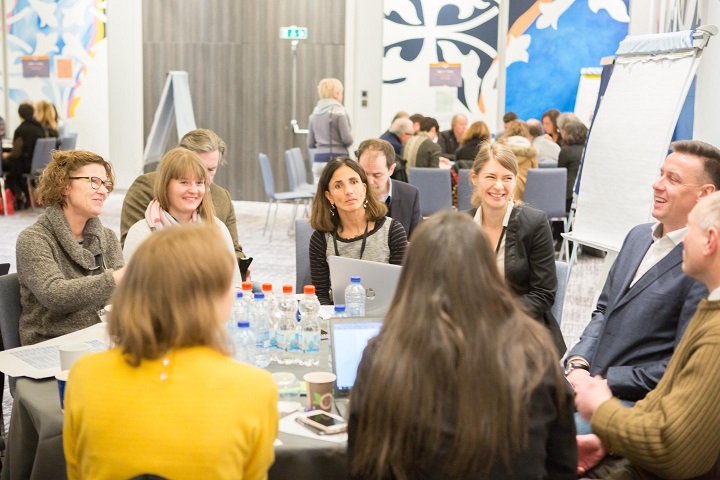Exploring the role of volunteers in delivering FEAD
The crucial role of volunteers in implementing the Fund for European Aid to the Most Deprived (FEAD) was the main theme of the ninth FEAD Network meeting, held in Brussels on 1 March. With most FEAD projects relying on the participation of volunteers, discussions focussed on the critical issues of successfully recruiting them, and adequately valuing their involvement. The meeting gathered around 70 participants from managing authorities and civil society organisations, including representatives of the Bulgarian, French, German, Hellenic and Italian National Red Cross Societies.
The role of volunteers in practice
“Volunteers are like windmills. They come in all shapes and sizes. Some are very visible. Some are more hidden. Some work alone, some in teams”, highlighted Gabriella Civico, Director of the European Volunteer Centre, while underlining the need to value this diversity. She went on to give an overview of the challenges faced by volunteers and those who support them.
Among these, Ms Civico emphasised the lack of data about the profiles of volunteers as an important barrier to the implementation of suitable policies at EU and national levels. Understanding volunteers’ motivations is essential to providing appropriate support. It is also important to reach out to people who are reluctant to work with volunteers. Ms Civico concluded by sharing ideas on how to invigorate volunteers, for example by setting up processes where skills and competencies can be recognised, or by proactively inviting people to volunteer, rather than waiting for them to approach the organisation.
Vassiliki Papachristou, volunteer team coordinator at the Ioannina branch of the Hellenic Red Cross, explained the role played by volunteers in implementing FEAD in her city. The branch’s Social Welfare Service counts on around 60 volunteers, who when recruited followed a training programme made up of a 2-month theoretical course, a 90-hour volunteer internship, and a written test.
FEAD volunteers are responsible for several activities, such as contacting potential beneficiaries, offering counselling and information, and receiving, storing and packaging food. Indeed, from August 2015 to December 2017, 23 distributions were carried out in the city, benefitting a total of 269 people. In Ioannina, volunteers have not only been key to delivering food aid, but have also managed to provide further assistance and advice to increase social inclusion, thanks to the trust they have built with end recipients over the years. However, Ms Papachristou stressed that retaining volunteers is one of her biggest challenges, as many of them are students who tend to move on to other cities when they have finished their studies.

© European Commission
Learning from national practices
How should volunteers be recruited and trained? How can trust be built with end recipients? These are some of the questions that participants discussed during the marketplace session, where five country case studies (Sweden, Italy, Poland, France and Croatia) were presented on a rotating basis.
Roberta Fusacchia and Michela Fornelli shared insight into how the Italian Red Cross trains its 150,000 volunteers. Following a general induction course and first aid training, volunteers can choose where they want to be active. They can either specialise in one field of activity, or choose to take up specific positions such as operators, coordinators or trainers. They then receive more specific training, which addresses skills like active listening, leadership and communication.
Training is great tool for recognising the contribution of volunteers. It can help to build a sense of community among volunteers, but also benefit each individual by developing capacities and knowledge that can be used elsewhere, including in the workplace. In addition, capacity-strengthening can be empowering in the longer-term, as volunteers become trained citizens who can care for others once they have left the organisation.
Download the European Commission meeting report
The Fund for European Aid to the Most Deprived is the EU programme dedicated to aid and support to the most vulnerable groups in society. The FEAD Network gathers civil society organisations, FEAD managing authorities, and other organisations involved in providing assistance to some of the most vulnerable people in Europe. Several National Red Cross Societies participate in the network and regularly contribute regularly their experience and expertise to the meetings.
For media inquiries, please contact Eva Oyón on: eva.oyon@redcross.eu or +32 2 235 09 22

